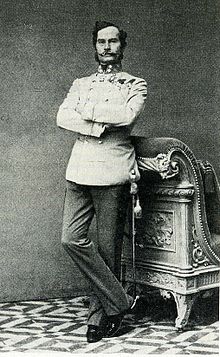Wilhelm von Ramming

Wilhelm Freiherr von Ramming von Riedkirchen (born June 30, 1815 in Nemoschitz , Bohemia , † July 1, 1876 in Karlsbad ) was an Austrian general .
Life
His father Wilhelm Ramming (born in 1770 in Lastau in Saxony) was raised to the nobility in 1822 with the title von Riedkirchen . After attending the Wiener Neustadt Military Academy on October 27, 1827, Wilhelm Ramming was appointed second lieutenant in the cuirassier regiment No. 7 Graf von Hardegg in October 1834 , with whom he served for the next five years. On November 30, 1839, he became a first lieutenant on the staff of the quartermaster general. His promotion to captain followed on June 20, 1845. Under FML Haynau he took part in the attack on Brescia and in the siege of Fort Malghera as well as in the fighting against the insurgents at Pieve di Cadore . On June 4, 1849 he was appointed lieutenant colonel . For the successful defense of the enemy at Monte Mauria on June 3rd and the occupation of Piave di Cadore on June 5th, 1849 he received the Order of the Iron Crown 3rd class. From May to August 1849 he took part in the fighting near Szered , Raab , Komorn and Szegedin as chief of staff of the FZM Haynau in Hungary . For the organization of the victories in the battle of Szöreg (August 5th) and Temesvár (August 9th) he received the Knight's Cross of the Order of Leopold . For his services as Chief of Staff of the Army during the summer campaign in Hungary, he was promoted to colonel on October 10, 1849 , and was awarded the Knight's Cross of the Maria Theresa Order on March 26, 1850 at his 157th doctorate . His work The Campaign in Hungary and Transylvania in January 1849 (Pest 1850), published after the war, aroused general interest in the history of the war.
Raised the rank of baron on June 4, 1851, after the peace he remained Chief of the General Staff of the 3rd Army in Hungary. On May 17, 1854, he was promoted to major general . After he had been chief of staff of various army corps for several years, he received a brigade with the III. Army Corps and was made a Lieutenant Field Marshal on June 28, 1859 .
With his brigade he took part in the Sardinian War and the unfortunate Battle of Magenta in 1859 . Thereupon he was assigned with the rank of general to the chief of staff Heinrich von Hess as chairman of the operations chancellery and had a “contribution to the battle of Solferino ” printed as a “manuscript” in Zurich .
After the preliminary peace of Villafranca was concluded in 1859, he was given the rank of field marshal lieutenant in charge of the operational business of the quartermaster general. In 1864 he was given command of the VI. Army corps, which he also commanded in the war with Prussia in 1866. Repulsed by the army of the Crown Prince of Prussia in the Battle of Nachod on June 27 , his corps formed the reserve at Skalitz and Königgrätz . After the war he acted successively as commanding general in Prague , Sibiu and Brno . In 1868 he was appointed Feldzeugmeister on an honorary basis . After that he lived from 1873 as a lifelong member of the manor house and captain of the Arcièren Life Guard in Vienna and died July 1, 1876 in Karlsbad.
literature
- Constantin von Wurzbach : Ramming von Riedkirchen, Wilhelm Freiherr . In: Biographisches Lexikon des Kaiserthums Oesterreich . 24th part. Kaiserlich-Königliche Hof- und Staatsdruckerei, Vienna 1872, pp. 312–315 ( digitized version ).
- R. v. R .: Ramming von Riedkirchen, Wilhelm Freiherr . In: Allgemeine Deutsche Biographie (ADB). Volume 27, Duncker & Humblot, Leipzig 1888, pp. 215-218.
- Christoph Tepperberg : Ramming von Riedkirchen Wilhelm Frh. Von. In: Austrian Biographical Lexicon 1815–1950 (ÖBL). Volume 8, Verlag der Österreichischen Akademie der Wissenschaften, Vienna 1983, ISBN 3-7001-0187-2 , p. 408.
Individual evidence
- ↑ Ramming of Ried churches . (Internet Archive) ( Memento from July 5, 2008 in the Internet Archive )
| personal data | |
|---|---|
| SURNAME | Ramming, Wilhelm von |
| ALTERNATIVE NAMES | Ramming von Riedkirchen, Wilhelm Freiherr von |
| BRIEF DESCRIPTION | Austrian general |
| DATE OF BIRTH | June 30, 1815 |
| PLACE OF BIRTH | Nemoschitz , Bohemia |
| DATE OF DEATH | July 1, 1876 |
| Place of death | Carlsbad |
